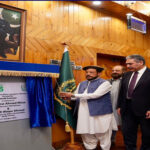
GILGIT: The China-Pakistan Economic Corridor (CPEC) could not only address Pakistan’s energy shortfall but also prove to be a fortune changer for the Gilgit Baltistan region.
The CPEC is a collection of projects presently being implemented at a cost of $46 billion to rapidly expand and upgrade Pakistani infrastructure, as well as deepen and broaden economic links between Pakistan and China.
Minister for Kashmir Affairs and Gilgit Baltistan, Chaudhry Barjees Tahir has said that CPEC would bring prosperity in the country, especially in Gilgit Baltistan.
During a meeting with a delegation of Pakistan Muslim League-Nawaz (PML-N) from GB, the minister said that the corridor would be proved as a milestone in the history.
The minister said that this project would also promote the tourism in GB, which would ultimately in the favour of local public. He said Pakistan Army troops would be deployed to make Karakoram Highway safe for the travelers.
He said the corridor passing through Gilgit Baltistan in the north to reach the Gwadar port in the south of the country will transform the economy and help bridge Pakistan’s power shortfall.
The Prime Minister Nawaz Sharif, in his recent visit to Gilgit Baltistan, laid the foundation stone of a fiber optic project, which is part of CPEC.
The project will be completed in two years at the cost of Rs 4.4 billion. Sources said that it would lay an 820 kilometres long cable from Rawalpindi to Khunjerab, which will provide an alternative telecommunication route between Pakistan and China after completion. As a result, people of Gilgit Baltistan will be the core beneficiary of this project because the region is still deprived of 3G and 4G and other modern telecommunication facilities.
Gilgit Baltistan Legislative Assembly Speaker Fida Muhammad Nashad said, “The CPEC will boost tourism to the 73,000 sq kilometres region, besides being home to the world’s second highest peak K-2 and the Nanga Parbat.
A local businessman Afzal hoped the route would open business opportunities for people of the region.
He said that CPEC would be a game changer for the region because establishment of one or two economic zones in the region will surely boost job and business opportunity for local educated youth and businessmen. Afzal said, “We can double our sales, earn more profits if we can sell our commodities to China where cherries are very popular.”
He said, “We export our products to Dubai by air, but it would be faster and cheaper if we could send it by road to China via Xinjiang as people of Gilgit Baltistan can get a one-year border pass to travel to China.”
According to the Asian Development Bank (ADB), Gilgit Baltistan is the producer of over 100,000 metric tons of fresh apricots annually.
Abdul Manan, who owned a farm house and export fresh and dried fruits to Middle East, estimates that Gilgit Baltistan is a producer of 4,000 tonnes of cherries and up to 20,000 tons of apples.
Parliamentary Secretary for Law and Justice of Gilgit Baltistan Legislative Assembly, Aurang Zaib Khan, said, “Diamer-Bhasha Dam, which is located in Gilgit-Baltistan, once completed, it would generate 4,500 MW of electricity and the people of Gilgit Baltistan are facing shortage of electricity now-a-days, and completion of Diamer Bhashah will surely minimise the power load shedding in the region.”























